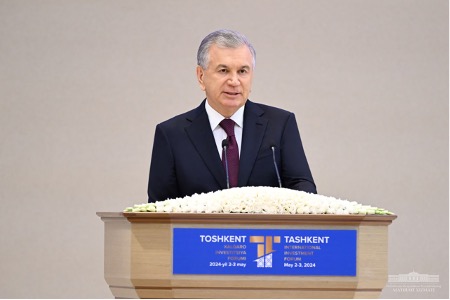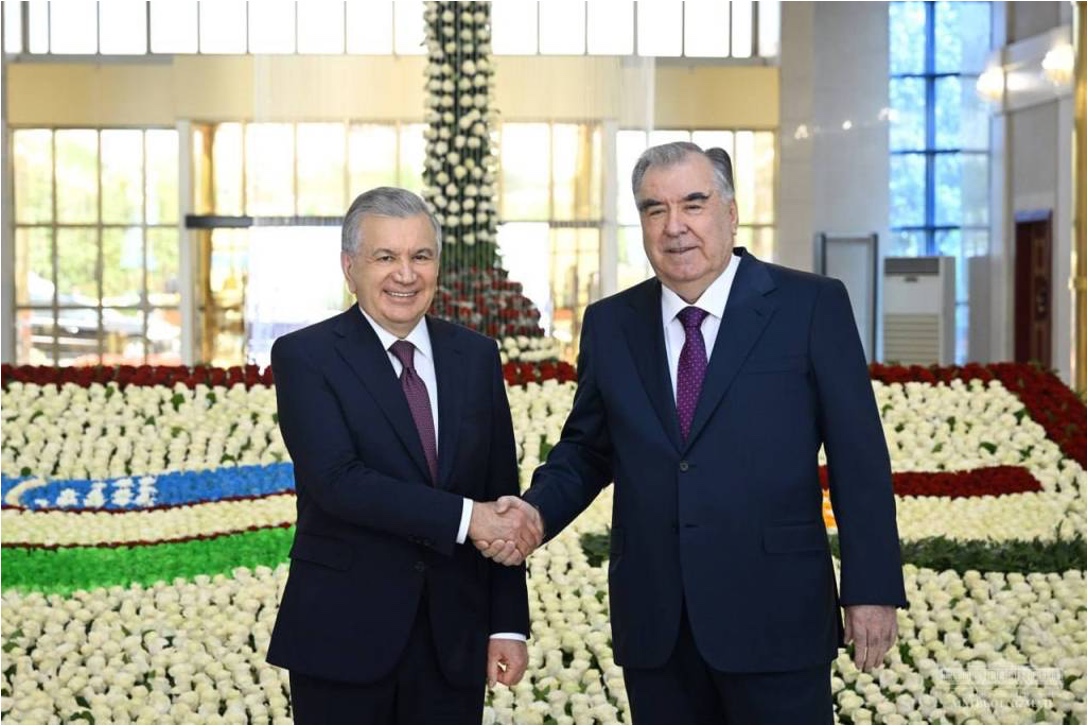
Address by President of the Republic of Uzbekistan Shavkat Mirziyoyev at the Third Tashkent International Investment Forum  Dear participants of the forum!
Dear participants of the forum!
Ladies and gentlemen!
At the outset, let me sincerely welcome you at the third Tashkent International Investment Forum.
I would like to note with pleasure that within the framework of this format, which is becoming a great annual tradition, new and reliable partners from all continents of the world are gathering in our country. Over the past three years, this Forum has provided a broad platform for enhancing collaboration, discussing pressing issues, and generating fruitful ideas and solutions to tackle the most urgent challenges.
READ MORE
- EGF Editor |
Published on EGF: 02.05.2024
| External Relations
-
Uzbekistan-Tajikistan: commitment to deepening cooperation based on principles of good-neighborliness and mutual trust  President Shavkat Mirziyoyev will pay a state visit to Tajikistan on April 18-19 at the invitation of President Emomali Rahmon.
President Shavkat Mirziyoyev will pay a state visit to Tajikistan on April 18-19 at the invitation of President Emomali Rahmon.
As close neighbors whose peoples are historically and culturally inseparable from each other, Uzbekistan and Tajikistan have brought their relations to the level of strategic partnership and alliance.
The close and constructive political dialog established between the leaders of the two countries, supported by regular bilateral and multilateral meetings, plays a huge role in the development of mutually beneficial and fruitful cooperation.
READ MORE
- EGF Editor |
Published on EGF: 19.04.2024
| External Relations
-
Yerevan’s ‘Crossroads for Peace’ Remains Elusive  By Vasif HUSEYNOV, PhD, Head of Department, AIR Center, Adjunct Lecturer, ADA and Khazar Universities, Baku
By Vasif HUSEYNOV, PhD, Head of Department, AIR Center, Adjunct Lecturer, ADA and Khazar Universities, Baku
On April 5, European Commission President Ursula von der Leyen and US Secretary of State Antony Blinken expressed support for the “Crossroads for Peace” project of Armenian Prime Minister Nikol Pashinyan during a press conference before their meeting in Brussels. The project, which was presented to the public during the Armenian premier’s address at the Fourth Silk Road Forum in Tbilisi on October 26, 2023, envisions opening new transportation routes across Armenia with the hopes of transforming the country into a regional transit hub. The project calls for the opening of connections between Azerbaijan and Türkiye via Armenian territory and aims to incorporate these links into east-west trade along the Middle Corridor. Neither Baku nor Ankara, however, has been consulted or declared any support for the initiative. Thus, Pashinyan’s project remains “on paper,” and failure to work directly with the Azerbaijan and Turkish governments may mean the idea never comes to fruition.
READ MORE
- EGF Editor |
Published on EGF: 17.04.2024
| External Relations
-
Reflection on the “Friends of Armenia Network” white paper  By Yeghia TASHJIAN, Beirut-based regional analyst and researcher, columnist, "The Armenian Weekly”
By Yeghia TASHJIAN, Beirut-based regional analyst and researcher, columnist, "The Armenian Weekly”
On March 27, 2024, a high-level group named “Friends of Armenia Network” headed by the former Danish Prime Minister and NATO Secretary General Anders Fogh Rasmussen published a white paper aiming to “galvanize support for democratic Armenia and promote peace in South Caucasus.” The title of the paper is “Deepening EU-Armenia Relations: More Europe in Armenia; More Armenia in Europe,” and the authors include former prime ministers, European parliamentarians and diplomats.
“Armenia is pivoting to the West,” the paper argues, and the EU has a strategic and value-based interest in supporting this pivot. To succeed, both Yerevan and Brussels need to make a “substantial, long-term strategic commitment in terms of resources, security cooperation, trade relations, and political engagement.” To make this pivot “irreversible,” the EU must grant Armenia “EU candidate status,” which would match Yerevan’s strategic orientation, back up its geopolitical commitments and minimize the impact of Moscow’s reaction to Yerevan by increasing the latter’s resilience.
READ MORE
- EGF Editor |
Published on EGF: 17.04.2024
| External Relations
-
Central Asian countries and the Gulf Cooperation Council: synergy of potentials  Uzbekistan, and Tashkent in particular, is becoming the venue for an important international forum that should give a practical vector to a new format of interregional cooperation based on the traditions of centuries-old exchanges between the peoples of Central Asia and the Arab States of the Gulf and today's huge potential for mutually beneficial co-operation.
Uzbekistan, and Tashkent in particular, is becoming the venue for an important international forum that should give a practical vector to a new format of interregional cooperation based on the traditions of centuries-old exchanges between the peoples of Central Asia and the Arab States of the Gulf and today's huge potential for mutually beneficial co-operation.
The first ministerial meeting of the Gulf Cooperation Council-Central Asia Strategic Dialogue was held on 7 September 2022 in Riyadh, the capital of Saudi Arabia.
READ MORE
- EGF Editor |
Published on EGF: 16.04.2024
| External Relations
-
Uzbekistan will gather folklorists and expect tourists from all over the world in May  On 1-7 May, the ancient and unique land of Surkhandarya will host the traditional international “Boysun Bakhori” (Baysun Spring) folklore festival
On 1-7 May, the ancient and unique land of Surkhandarya will host the traditional international “Boysun Bakhori” (Baysun Spring) folklore festival
Preparations for the festival, which will unite bearers, performers and masters of folklore and ethnographic art from all over the world, are being carried out in a completely new spirit. In the modern tourist complex in Bibishirin mahalla, where its main events will take place, all conditions are being created for performances of folklore and ethnographic groups, national sports games and other various performances.
READ MORE
- EGF Editor |
Published on EGF: 10.04.2024
| External Relations
-
Geopolitics of the South Caucasus Intensifies  By Vasif HUSEYNOV, PhD, Head of Department, AIR Center, Adjunct Lecturer, ADA and Khazar Universities, Baku
By Vasif HUSEYNOV, PhD, Head of Department, AIR Center, Adjunct Lecturer, ADA and Khazar Universities, Baku
From March 17 to 19, Jens Stoltenberg, secretary-general of the North Atlantic Treaty Organization (NATO), embarked on his first tour of the South Caucasus, visiting Georgia, Armenia, and Azerbaijan (NATO, March 19). During this tour, he engaged with each country’s political leadership. In Azerbaijan, he also met with the defence and foreign ministers. Stoltenberg’s visit occurred amid deteriorating relations between Russia and Armenia, an ongoing stalemate in the Armenian-Azerbaijani peace process, and political uncertainty in Georgia before parliamentary elections in October 2024. Each one of these situations points toward the possibility of renewed confrontation and prolonged instability in the South Caucasus.
READ MORE
- EGF Editor |
Published on EGF: 05.04.2024
| External Relations
-
What Is at Stake in the Tavush Region?  By Benyamin POGHOSYAN, PhD, Chairman, Center for Political and Economic Strategic Studies
By Benyamin POGHOSYAN, PhD, Chairman, Center for Political and Economic Strategic Studies
Since Prime Minister Nikol Pashinyan’s March 18 visit to Voskepar and Kiranc villages in the Tavush region, discussions and debates have been underway in Armenia on the situation along the Armenia – Azerbaijan border in that region. The visit took place after the statement of the office of Azerbaijan’s Deputy Prime Minister Shahin Mustafayev, demanding the immediate return of “four non-enclave Azerbaijani villages’” located in Tavush along the Armenia – Azerbaijan border to Azerbaijan which were in principle covered in the demarcation and delimitation negotiations. During his meetings with villagers, the Armenian prime minister stated that “the process of delimitation and demarcation between Armenia and Azerbaijan was entering the practical stage.” Despite acknowledging that there were no agreements on maps and principles of the process and that Azerbaijan would not leave the Armenian territories currently under its control, the prime minister argued for withdrawing from those villages to avoid a new war. After these meetings, some representatives of the Armenian leadership, including the speaker of the National Assembly, started to state that those territories were not part of Armenia and should be returned to Azerbaijan.
READ MORE
- EGF Editor |
Published on EGF: 05.04.2024
| Security
-
Assessment of Child Poverty in the Republic of Uzbekistan  Center for Economic Research and Reforms (CERR), together with UNICEF, assessed the level of monetary child poverty in Uzbekistan. The study analyzed the impact of the social protection system on the poverty level. According to the calculations, in the absence of social payments, the child poverty rate in the country would have increased by 1.6 times.
Center for Economic Research and Reforms (CERR), together with UNICEF, assessed the level of monetary child poverty in Uzbekistan. The study analyzed the impact of the social protection system on the poverty level. According to the calculations, in the absence of social payments, the child poverty rate in the country would have increased by 1.6 times.
April 1, 2024. The Center for Economic Research and Reforms (CERR), together with the United Nations Children's Fund (UNICEF) in Uzbekistan, conducted an assessment of the level of poverty among the child population, as well as an analysis of the effectiveness of the social protection system.
READ MORE
- EGF Editor |
Published on EGF: 02.04.2024
| Markets
-
Remember Kazan, for history can repeat itself  By Benyamin POGHOSYAN, PhD, Chairman, Center for Political and Economic Strategic Studies
By Benyamin POGHOSYAN, PhD, Chairman, Center for Political and Economic Strategic Studies
The September 2023 military takeover of Nagorno-Karabakh by Azerbaijan was a watershed moment in the conflict. Azerbaijan achieved a decisive victory by force, defying decades-long widespread perception among OSCE Co-chair countries and other actors that the conflict had no military solution. Many expected that the demise of the self-proclaimed Nagorno-Karabakh Republic would pave the way for the Armenia – Azerbaijan peace agreement, thus bringing long-awaited stability to the region. However, it appeared that the issue of Nagorno-Karabakh was only one part of the bigger puzzle of Armenia–Azerbaijan relations. After September 2023, Azerbaijan brought back the narrative of a corridor via Armenia to connect Azerbaijan with Nakhichevan, despite the fact that there was no Lachin corridor anymore connecting Armenia with Nagorno-Karabakh and started to highlight the necessity to change the Armenian constitution and other laws
READ MORE
- EGF Editor |
Published on EGF: 27.03.2024
| External Relations
-
